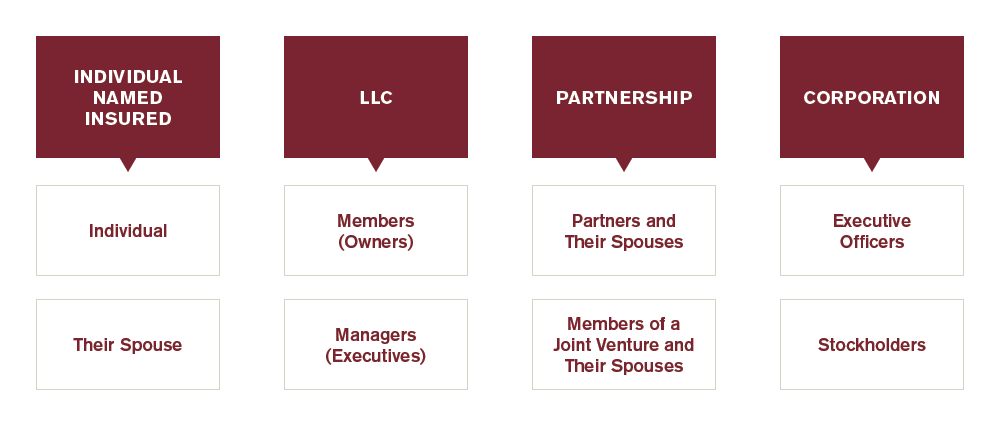
Properly Insuring the Small-Business Owner
By Amber Rutledge, Claims Counsel
One of the most significant differences between personal lines and commercial lines is who or what the Named Insured should be.
In personal lines, the Named Insured will generally be an individual (or individuals) or a married couple. The “Insureds” by definition will be resident relatives, permissive users of vehicles, people who care for animals while the Named Insureds are out of town and others who fall within the definition due to situations that come up naturally in day-to-day life.
For a business policy, the Named Insured can be a variety of legal organization types and there may need to be multiple Named Insureds on a single policy due to legal arrangements involving business operations versus ownership of business real estate. It is important to understand how your policyholder’s business is organized and how it operates to ensure you are properly guarding the correct legal entity as well as the individuals who own or act for that entity. This can be complicated and may take some additional steps on an agent’s part because many businesses, even if they are “small,” have been organized by an attorney hired by the business owners when they started their business.
Small-Business Descriptions
I grew up as the child of small-business owners. My dad owned a small septic company and, along with a few employees, did the actual septic work while my mom managed the office.
If a stranger would ask my dad what he did for a living, he would say “I’m a small-business owner” or “I own a septic company.” This description of his business, while true, was not specific in that he owned an S-corporation that operated the business and leased property owned by an LLC, and that he and my mom were the sole members (owners).
There are many potential reasons for the simpler business description. It would be socially awkward for someone to describe a business in terms of its legal organization in a casual conversation.
However, it also could be that the legal organization side of the business is something the small-business owner doesn’t fully understand or isn’t interested in. Perhaps the owner considers the S-corporation and LLC setup as something a lawyer filed for them when the business was starting. It is merely the way a lawyer told them was the smartest way to organize their new business. The lawyer does annual filings and sends a copy and an invoice that are filed and paid without much thought because the business owners are focused on the business.
While it makes sense to avoid describing the legal organization in a social setting, incorrectly describing a business on an insurance application can cause a significant impact on who is afforded liability coverage provided under a commercial policy.
Business Organizations
The four main types of business organizations are sole proprietorships, partnerships, limited liability companies (LLCs), and corporations.
For any type of business organization, the Named Insured will be the entity listed in the declarations. If the policyholder has described the entity incorrectly, perhaps by checking both “Individual” and “Corporation” on the application, that may be sorted out if a claim occurs as to what business the Named Insured should have been.
However, the type of entity listed on the declarations has a significant impact on who becomes an “Insured.” For any type of legal entity, the business’s employees and volunteers would by definition become “Insureds.” Once you move beyond the employees and volunteers of the business, the “Insured” becomes more complicated and is dictated by the type of business organization. This is illustrated by the chart below:

This chart shows how an incorrectly listed business entity on the declarations could result in very different individual people who would be considered “Insureds” in the event of a liability claim.
Case Study
To illustrate the problems that can arise when the business entity is not listed correctly on the declarations, consider the following scenario based, in part, on my parents’ septic business.
In 2012, Dad and Mom decide to start a septic business. They buy a small building so they can have a storefront and office as well as space to store equipment and park a pump truck. Dad goes to his insurance agent to apply for insurance and lists himself as an “individual” on the application, which would be considered a sole proprietorship. Uncle and Aunt work for the business without any ownership interest.
After a few years and some profit, Dad and Mom decide to let Uncle and Aunt buy into the business as well as the real estate because the business needs the additional capital to grow. They decide to name the business “Drain Kings.”
The four visit a lawyer because they know their handshake agreement isn’t the proper way to manage the business. The lawyer helps them to create Drain King, LLC and transfer the real property into that LLC of which all four individuals are members (owners).
The lawyer also helps them create Drain King, Inc., which operates the septic business. Drain King, Inc. leases the building from Drain King, LLC (this is a common legal setup for real estate jointly owned by different families).
This all happens after a short meeting at a lawyer’s office. It doesn’t feel like that significant of a change since nothing in the day-to-day operations is altered. Dad doesn’t think to call his insurance agent because there are no new vehicles or buildings that need to be insured.
In 2022, a customer falls when visiting the office to make a payment and is injured. The claimant hires an attorney. The attorney files a lawsuit naming Drain King, Inc. and Drain King, LLC as defendants. From public records, the attorney learned about Aunt and Uncle’s ownership interest and names them as well. Since the insurance policy is still issued to Dad as a sole proprietorship, the only people entitled to a defense and indemnity under the policy are Dad and his spouse, Mom.
At this stage, the insurance company opts to deny any duty to even hire a defense attorney for Aunt, Uncle, LLC, and Inc. because they aren’t “insureds” under the policy. The uninsured entities and people are forced to hire their own defense attorneys, at significant personal expense, and an E&O claim results.
Assisting Your Policyholders
To avoid this type of situation, the first thing to do is simply recognize the gap in knowledge between policyholders and those who are in the insurance world and then learn how to best navigate that gap with your policyholders.
The doctrine of reasonable expectations exists because even judges recognize that very few policyholders actually read their own insurance policy. Although insurance is part of your and my day-to-day life, most people equate insurance as something the state or their bank requires them to have and many may not give it a second thought after taking out the policy except when paying their bill or dealing with a claim that arises.
Many people may consider insurance as a “get it and forget it” product and as long as they update their agent with changes in property and vehicle ownership and pay the premium, they will be covered when a claim arises.
Searching Your State
For new business, one easy step to consider as part of your application processing checklist is conducting a business search on the website of the department that regulates business organizations in your state.
Often the search function allows you to search by individual name as well as the business name so that can bring to your attention all businesses an individual is associated with, which allows you to follow up as appropriate with your applicant. The links for the business search databases in the seven states in which WRC Agency does business are:
For a package policy that includes property coverage, there are similar county and municipality websites that allow a searcher to find the official titleholder of the property. This could be helpful if the applicant is uncertain if their business is organized in the commonly used S-corporation with LLC configuration.
For renewals, consider adding a sentence to your renewal notice or invoice asking if the policyholder has discussed any business changes with a lawyer or accountant in the past year and ask that they contact you if they have had any changes that could impact their insurance. Asking questions at all stages of the agent/policyholder relationship is always the biggest impact in making sure the policy is properly written and your applicant or policyholder will appreciate your interest in his or her business (at least if they are anything like my dad).
Finally, remember that just like an insurance agent calls a septic company when there are problems with their septic system, the small-business owner relies on an insurance agent to ensure the business and all the individuals associated with it are properly protected by the liability insurance policy.
Contact Us
If you have any questions about identifying the Named Insured in your business policy, contact us today.
